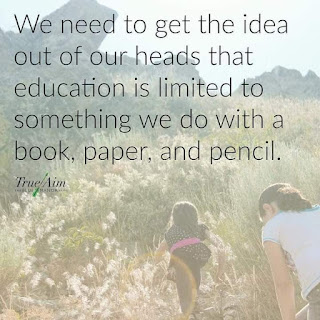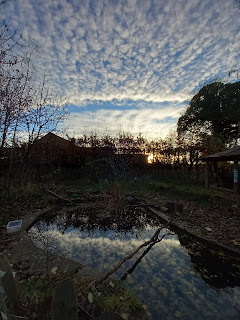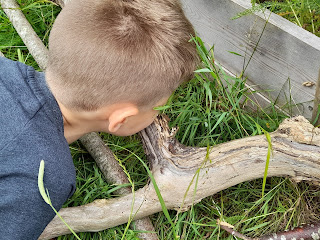Why Forest School?
I'm going to assume that most people who read this regularly have some kind of connection with Forest School. They are FS trained to some level, work in or with a FS, have children in a FS, at the very least like the idea of FS!
There is a lot of good quality outdoor learning across the UK. In some countries, it is more highly developed by Government than others, although I know many in those systems want to see it go further! For instance, lots of people look towards the Scottish drive for outdoor learning with the wistful hope that it will spread south of the border! But being good doesn't mean you can't be better!
Having any kind of Outdoor Provision needs constant review and development, in the same way that learning inside schools never stands still, neither does the opportunity to take learning outside. Early Years/Pre School/0-5 has this embedded in their curriculum, and recent years has seen KS1/infant education push for more learning outside.
Personally, I'd love to see it pushed harder and extended into at least KS2!
But this needs to run alongside good Forest School Sessions.
For instance, if a class is about to write a Winter poem and it IS winter, go outside, feel the chill in the air, see either a bright, crisp day or low dull cloud. See what the shadows are like, what the trees are like, what you can hear, smell, and even taste in the air. If it has snowed, or if there is frost, look at the sparkle, feel the texture, examine the patterns... Yes, there are amazing photos on google that will create an amazing PowerPoint on all these aspects, but it's the difference between a class seeing them and feeling them. It will have a great effect on their writing, not just for the one poem, but a memory to draw on in future when describing winter.This is an easy Outdoor Learning Lesson. Children can write words on whiteboards, or post-its, or on clipboards while outside. They can take their own photos, it can be videoed, they can do talk partners outside... or it can be done when they get back in. It can be a whole hour outside including writing outdoors, or a 10-minute walk to set up the lesson. It can be as involved as a teacher chooses.
It is not however the remit of Forest School to do this precursor to writing.
Winter, like all the seasons, will be acknowledged. Vocabulary and information will be introduced and even discussed. Weather descriptions will take place, including weather effects, and consequences. Children may well take this knowledge back to class and use it, but FS doesn't have a 'learning intention' to ensure every child participating is able to do so.
Forest School is not a weekly session to offload some of the curriculum onto.
There will always be an overlap, and frequently the two are symbiotic, but once you send children to a Forest School session with a specific outcome, even if it is an outcome they will naturally encounter, then it ceases to be Forest School.
Why?
Well, the biggest reason is because FS follows the child's interests. This last fortnight we've had 'high summer' with hot weather and sunshine, and 'autumn monsoons' with sometimes humid, sometimes chilly, but very, very persistent rain! Across this time we've had children bird watching, hunting for caterpillars, looking for fungi, climbing trees, challenging their physicality, creating see-saws, making obstacle courses, listening to birds, measuring growing plants, collecting feathers, whitling, binding, storytelling, digging, building, making mud pies, looking closely at nature... to name but a few things, and this is the norm. The moment the decision is made to focus solely on, digging a hole for instance, then all the other disappears. When the rest goes it leaves children obliged to participate, reluctantly, with little interest in the task or the result.
The strength of Forest School comes from children feeding their own curiosity, seeking ways to explore more, developing an understanding of how to investigate and examine. They communicate, predict, experiment, and deduce. They use resources to find information, research independently and ask questions. They see outcomes and problem solve, adjust, and LEARN. Whether it's as simple as the best position to try and see a bird of prey overhead, the correct tool for digging around stones, or what kind of habitats they need to seek for bugs in.
Of course, they don't see any of this as 'learning', but they automatically use these skills when they are outside. No one asks 'why can't I find a woodlouse?' they ask 'where is best to find a woodlouse?'. They don't say 'I can't use the palm drill', they say 'show me how to use the palm drill'. They don't say 'I can't climb a tree', they say 'can you help me climb a tree'. I can't think of one child out of 350 who uses defeatest language outside - they are all eager to find a way to achieve whatever it is they want to do.
This is what Forest School is meant to bring to education. Whether it's within a school or not, children who attend sessions learn skills like determination, curiosity, resilience, problem-solving, persistence, courage, repetition, communication, etc, etc, etc, that they can take back into the classroom.
A room full of children with improved listening skills, an open attitude to the task ahead, and the self-esteem to have a go is more useful than a mixed bag of possibly memorised phrases about winter!
This week was wet, at times REALLY wet! This was a bit miserable for children who were not dressed appropriately, although the opportunity to get soggy, uncomfortable, itchy and irritable taught much more than the observations beforehand that that would be the inevitable result! Hopefully in the next session they will have both coats and wellies!! However the vast majority were prepared for the weather, and to be fair, even those in trainers in ankle-deep mud had a huge amount of fun before they regretted it! Rain is an amazing resource and it never fails to amaze me where the children manage to source puddles! A wet digging area is never wet enough!
Usually, children will use the tool area, then move away, or look at the nature table, then move away. Drawing suddenly became the staple way to pass the time. Pictures of album covers, of bubble writing, of pets...
Basecamp became what a classroom is during wet play. Interestingly the children started to get bored, yet it didn't occur to them to wander off, they were rooted to the speaker and the idea they could somehow get the song they wanted to play out of it.
The children lost out on a Forest School session. Distracted by the total shift in focus away from nature, outdoors, and even from choice.
Don't get me wrong, music outside is great, and even at FS it has its place; singing around the campfire, once seated with a drink and a snack, especially spontaneously by the children. Forest School is a place to regularly do things you CANNOT do inside, climb trees, play as a large group, explore and wander, discover, and get ridiculously muddy! This time music was a distraction from everything else, and the children were focused on the equipment, the DJ, and genre choices!
Not every child stayed at basecamp. Those who did, didn't build their muscles digging and climbing, follow their curiosity, stretch their self-esteem, or probably even enjoy the session very much! I know the adults didn't! Those who went off to explore returned to sit together rosy-cheeked, damp, muddy, bright-eyed, and having been laughing a lot might argue that point!
It was interesting to watch. Next week will be different.
So Why Forest School?
- Because it's NOT break time.
- Because it's NOT a set lesson.
- Because what you do is not rigid.
- Because you have to set yourself boundaries and learn how to do things independently (with support).
- Because all the skills you get to practice will stand you in good sted for life.
Forest School builds attitudes and dispositions and well as the opportunity for knowledge. Running Forest School alongside Outdoor Learning is extra productive! So watch this space! As of September we step it up a notch!









Absolutely this, 💯 💕
ReplyDelete